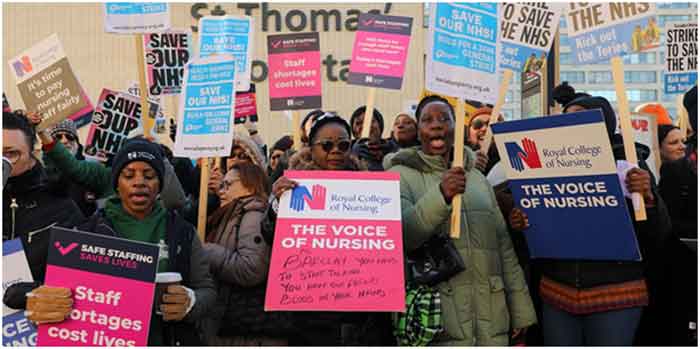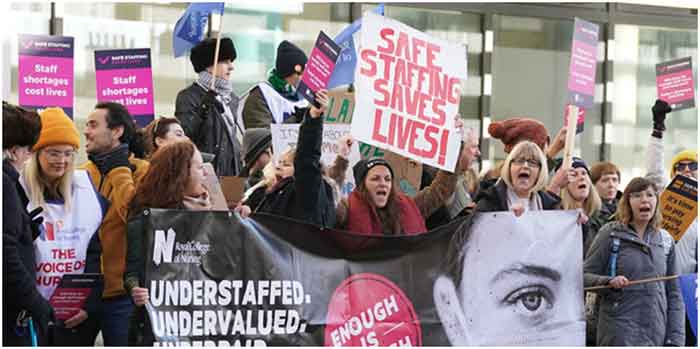
More than 100,000 nurses in England, Wales and Northern Ireland walked off the job on Thursday in the largest strike in the 106-year history of their union, the Royal College of Nursing.
The Royal College of Nursing (RCN) launched the biggest strike, warning that an NHS staff exodus is “costing patients their lives.”
Drivers showed support for thousands of striking hospital and health trust staff across England, Wales and Northern Ireland by beeping their horns and cheering from car windows, while members of the public brought chocolates to picket lines nationwide.
RCN general secretary Pat Cullen said the 24-hour walkout, set to be followed by a second next Tuesday, was a “tragic day for nursing and patients.”
But she stressed that the action, which is targeting non-emergency care, is unavoidable as this year’s massively below-inflation wage deal — worth 4.75 per cent for most workers — is exacerbating record high staffing vacancies and further endangering patient safety.
Outside Liverpool’s Aintree University Hospital, nurses held placards with slogans reading: “You clapped for us during Covid, now act for us” and “If nurses are out here, there’s something wrong in there.”
One worker, Pamela Jones, said: “The public need to understand the pressures that everyone’s under. You’ve only got to come into A&E and see the queues, there is no beds.
“We want to save our NHS and I think this is the way forward.
“We do not want to be here. I was really torn about striking because it’s not something I ever, ever thought in my lifetime I would have to do, but the government has pushed us to this — I hope it listens.”
Ministers repeated their claims today that above-inflation salary increases are “unaffordable,” despite billions of pounds of fraudulent Covid-19 loans being written off and a failure to rule out further increases in defense spending.
Health union Unison slammed reports today that the government is set to reconvene the supposedly independent NHS pay review body, saying only “direct talks” between unions and ministers will resolve the dispute.
Unison head of health Sara Gorton said the body, which has its remit set by Downing Street, had “already failed” workers by proposing this year’s real-terms wage cut.
“Ministers are hiding behind the pay review body to wriggle out of any responsibility for the mess they’ve created,” she charged.
Liverpool staff nurse Kelly Hopkins, who has worked in the NHS for 25 years, called for action as her colleagues were “coming into work to care for other people and no-one’s caring for them.
“They are having to use foodbanks, they’re coming in cold, they’re going without food to feed their children, it’s just crazy.”
Ms Hopkins added that wards are understaffed, which is “affecting patient care — unless we stand up and say something, it’s just going to get worse.”
Linda Tovey, a critical care nurse who joined a picket line outside central London’s St Thomas’ Hospital, warned that there were not enough staff and the system was “under so much stress.”
Reflecting on her pay, Ms Tovey reported cutting down on cooking “since I realized to cook one meal costs the same as it used to cost for a whole day’s electricity.”
Dozens of strikers picketing at Leeds General Infirmary cheered as virtually every other passing vehicle honked horns in support.
The show of solidarity even extended to four passing police cars, with the occupants turning on their blue lights and sirens and waving to workers before driving off, the Morning Star was told.
Ambulances heading to A&E also joined in. More than 10,000 paramedic staff, emergency care assistants, call handlers and other staff — represented by Unite, Unison and GMB — are also set to down tools over pay on December 21 as the disputes look set to continue.
According to Sky News, about a quarter of hospitals and community teams in England, all trusts in Northern Ireland, and all but one health board in Wales are taking part in the industrial action, which is scheduled to continue on Tuesday.
British nurses have reached a “crisis point,” leaving them no choice but to strike, RCN committee chair Denise Kelly told Sky. Citing “years of real-terms pay cuts,” a multi-year public-sector pay freeze, and the runaway cost of living, the nurses are demanding a 19% pay rise – the inflation rate plus five points.
The government has offered a pay increase of just 4.5% for most nurses, with those at the lower end of the pay scale receiving up to 9%. A spokesman for PM Rishi Sunak called the offer “fair and reasonable” on Thursday, pointing out that nurses had gotten a 3% bump last year.
Beyond financial woes, many nurses argue that patients’ safety is being put at risk. A community matron at London’s St. Thomas Hospital told Sky that “nurses are burnt out” to the point that it endangers patients, with facilities so understaffed that “one nurse is doing the work of three.”
A practice development nurse picketing outside Addenbrooke’s Hospital in Cambridge claimed that since Covid-19, “the workload has doubled” and “patients are coming through a lot sicker” – with no extra staffing to reflect the change. Others cited tens of thousands of vacancies with no one to fill them.
Patients’ advocacy group the Patients’ Association has expressed solidarity with the nurses. CEO Rachel Power begged the government to “get round the table with the RCN and find a solution to this” during this “scary time.”
Despite growing pressure from the public and even from within the Conservative Party, however, 10 Downing Street has insisted there are “no plans” to reconsider nurses’ pay packages. Health Secretary Maria Caulfield has argued that every 1% extra in pay increase would cost the public £700 million ($853.25 million), and trying to match inflation would just make the problem worse.
Sunak Signals Crackdown On Unions
UK Prime Minister Rishi Sunak has said he will support “tough new laws” targeting labor actions, even suggesting an outright ban on walkouts by certain employees, after thousands of emergency workers announced upcoming strikes, demanding pay raises amid soaring inflation.
Addressing MPs on Wednesday, Sunak warned that a wave of imminent strikes in multiple sectors, including healthcare and public transit, would cause major disruptions, and pledged to do “whatever I need to do to prevent work stoppages in vital industries.
“If the union leaders continue to be unreasonable, then it is my duty to take action to protect the lives and livelihood of the British public,” he continued, adding: “Since I became prime minister I have been working for new tough laws to protect people from this disruption.”
The prime minister’s comments came just one day after the Unite, Unison and GMB unions – which represent ambulance workers, paramedics, call handlers and emergency care assistants – said they would launch coordinated strikes involving more than 10,000 employees on December 21 and 28. A number of other walkouts are scheduled in the coming weeks, including a strike by railway, mail, bus and education workers across the UK.
Different administrations have proposed laws that would enforce minimum levels of service during labor strikes since 2019, and a bill containing that requirement is now passing through Parliament. Lawmakers have yet to debate the legislation, which is still at an early stage.
British public sector workers are campaigning for a pay rise above inflation, which exceeds 12% amid the cost-of-living crisis. The UK has been suffering from rising energy prices since last year, and the crisis worsened when Western nations imposed economic sanctions on Russia due to the Ukraine conflict.
UK Minister’s Call: Send Message To Putin
UK unions should “send a message” to Russian President Vladimir Putin, and stop “chasing inflation” with their demands for pay hikes in the public sector, Nadhim Zahawi, the chairman of the Conservative Party, has said.
The top Tory official, who holds the position of minister without portfolio in Prime Minister Rishi Sunak’s cabinet, made the remarks during an interview with Sky News’ Sophy Ridge on Sunday. The two were discussing potential pre-Christmas strikes, particularly by nurses and ambulance drivers employed by the National Health Service (NHS).
“To ask for a 19% pay rise, which would cost the NHS $12.3 billion I think it is the wrong thing to do right now,” he said regarding the union demands.
“We have to come together. This is not he time to be divided. I hope we will send a very clear message to Mr. Putin and that he cannot use energy as a weapon in this way,” he added.
The UK has been suffering from rising energy prices since last year. The crisis worsened when Western nations imposed economic sanctions on Russia due to the Ukraine conflict.
Ridge noted that for many of the people trying to catch up with the cost of living, it is a matter of survival.
“A nurse on 20 grand a year would think that maybe there are other ways of sending Putin a message on Ukraine,” she said.
The union’s leader, Pat Cullen, called Zahawi’s remarks on Ukraine “a new low for this government.”
“The public does not believe this kind of rhetoric and wants ministers to address our dispute,” she said, as quoted by The Independent.











































